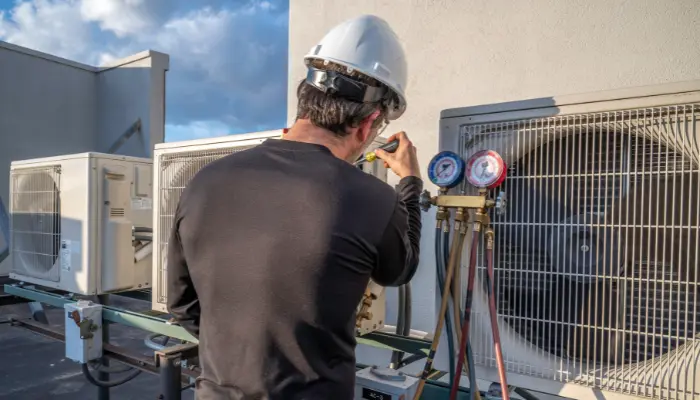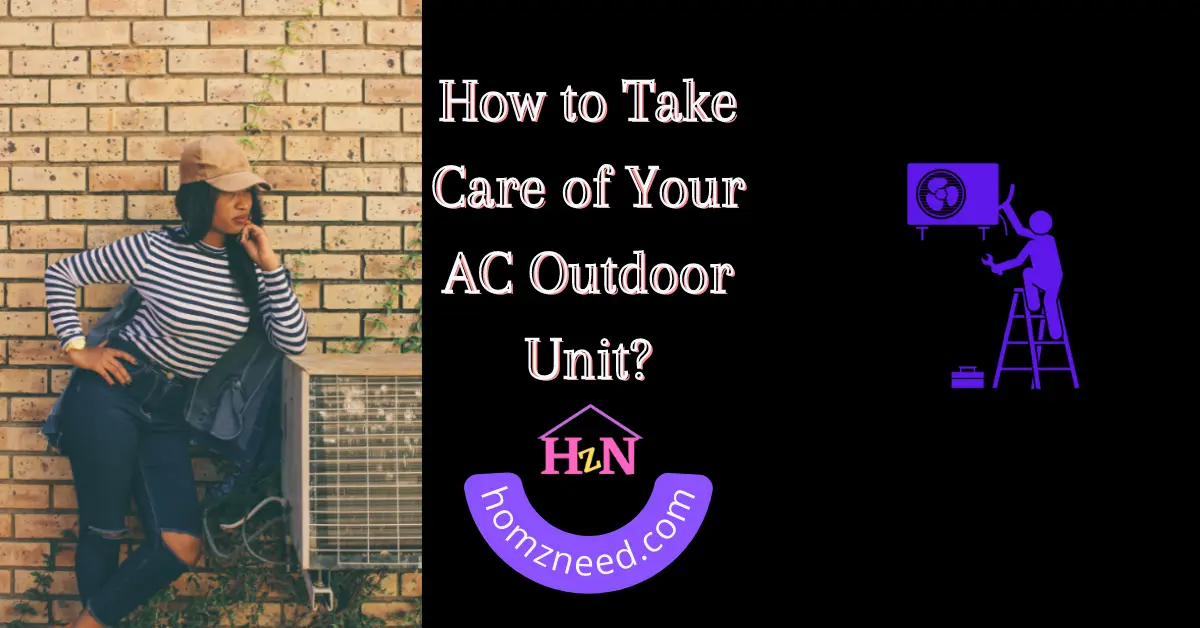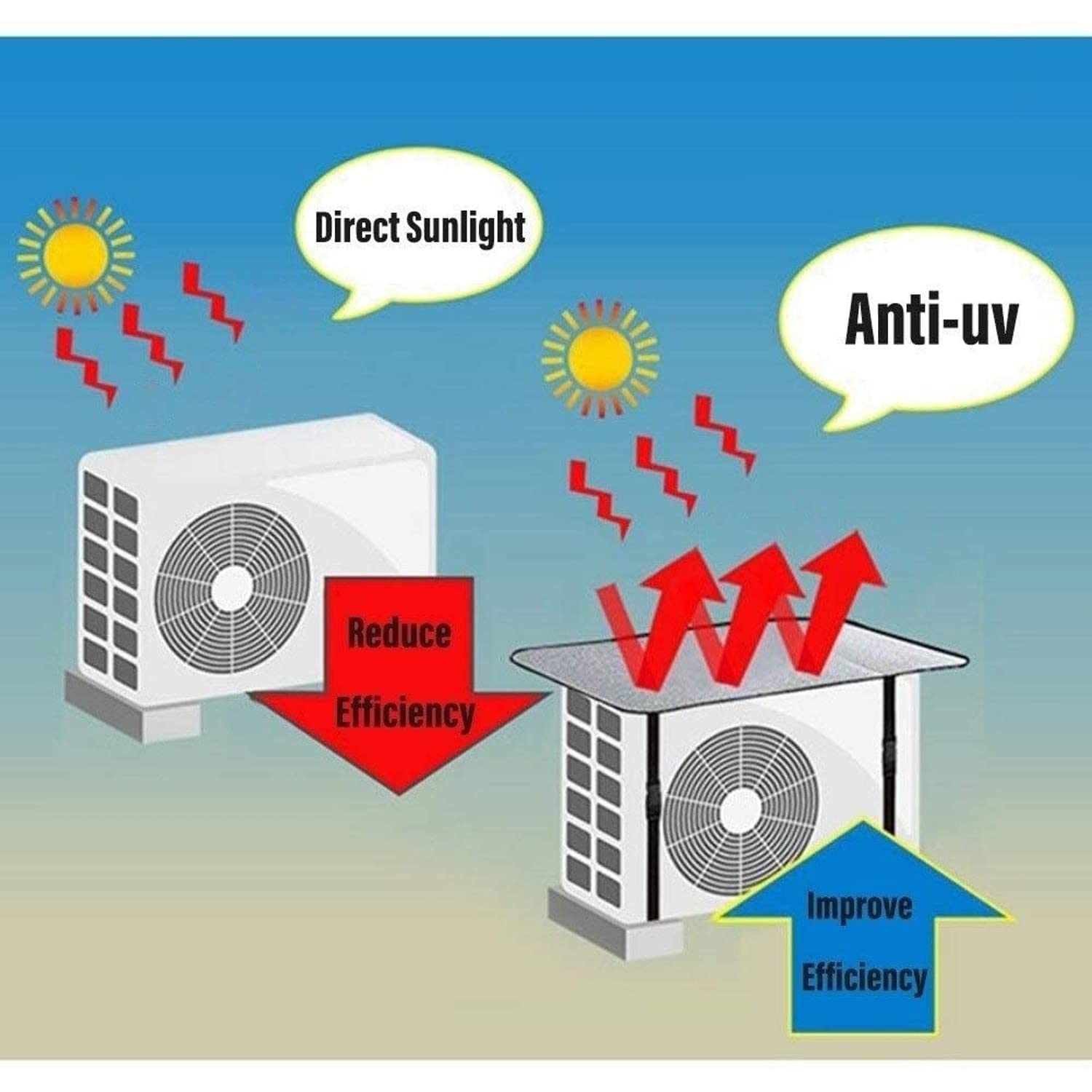An outdoor AC unit is toughly built to withstand those elements it is exposed to throughout the year. Still, as a house owner, you should do certain things to protect your AC outdoor unit against damage. Maintaining this outdoor unit properly and keeping it clean and intact ensure its longevity. As a result, this promotes a more comfortable temperature indoors around the year for you and the other family members. But do you know exactly how to take good care of your air conditioner? This post shares what you are required to do.
Also Read
- Fridge Organization Ideas That Every Household Should Know
- How to Defrost a Fridge – 7 Steps to Do it Safely
- Why is My Fridge Not Cooling? 10 Potential Reasons
Why is it important to take care of your AC outdoor unit?
While the inside of your home is important, the outside is just as crucial when it comes to your air conditioner. Your AC outdoor unit is constantly exposed to the elements, which can take a toll on its performance. That’s why it’s important to take care of your AC outdoor unit by doing regular maintenance and troubleshooting any issues that may arise.
One of the most important aspects of taking care of your AC outdoor unit is cleanliness. Dirt, debris, and even pollen can build up on the unit and hinder its performance. In extreme cases, this build-up can cause the unit to overheat and break down. That’s why it’s important to clean your AC outdoor unit on a regular basis.
Another important aspect of taking care of your AC outdoor unit is making sure that it’s properly ventilated. If the unit isn’t properly ventilated, it can overheat and break down.
An AC’s filters, fins, and coils need regular maintenance so that the unit can function efficiently and effectively throughout its service years. Neglecting the essential maintenance leads to a steady deterioration in the air conditioning performance and a stable increase in energy use.
What are some simple things you can do to keep it running smoothly?
- Select the right location. Your AC system often runs in hot weather. If you installed it at the right spot, it would get shade against the scorching heat. Most experts suggest allowing 2 to 3 feet of clearance on each side of the unit and a minimum of 5 feet above. Doing so would let the AC release more heat effectively, and you can enjoy greater comfort sans your energy bills going up.
- Keep things clean. Weeds, dust, and other obstructions reduce the airflow through your condenser, interfering with its ability to effective cooling. For greater energy efficiency and better AC performance, keep your outside unit free of encroaching greenery or debris.
- While you do the AC outdoor unit cleaning, straighten and clean the fins. Replace or wash the air filter. Inspect the condenser coils because dust and debris hamper the cooling performance. Vacuum these away.
- Check your gutters to prevent water from leaking into your exterior air conditioning unit.
- If your outside AC unit is inside one fenced yard, keep its gates locked to deter theft.
- Proceed with caution. You should occasionally monitor the area around your unit and be mindful of any such methods you will apply. Taking care of your landscaping or some extra care when mowing your lawn can prevent the external HVAC component from damaging. Blow and cut the debris away from your unit always.
- For your AC outdoor unit, a cover of tarp or any other protective material is recommended. This would safeguard your outdoor device against the weather, branches, leaves, and small animals.
An annual tune-up is necessary for the excellent health of your AC. Regular air conditioner maintenance is a must for keeping its heating-cooling system smooth for years. You should contact an established and experienced company for the most accurate results.

What are some signs that your outdoor unit needs some attention, and how can you troubleshoot common problems with your outdoor AC unit?
1. There is a lack of airflow
The air conditioning system’s compressor might fail when there is weak airflow via your vents. First, check the fuse box. If nothing is wrong with it, call a professional. Keep up with time-to-time HVAC (Heating, ventilation, and air conditioning) maintenance to reduce this hazard at your home.
2. Warm air is coming through AC vents
Check if warm air is coming through your vents and if your outdoor AC unit cannot provide cool air in the room. This is an indication that your unit has low refrigerant. Clean your evaporator. Else hire or contact an HVAC technician if this problem still impacts your indoor temperature.
3. Weird odors from the HVAC
Stinky odors from the HVAC system spreading throughout your home could indicate a gas leak, dysfunctional wiring, or accumulated moisture inside your cooling unit or ductwork. If it’s an electrical odor, immediately turn off your air conditioner and hire a pro. In case of a musty smell, you may change the air filter. But the best is- if you can invest in regular cleaning of the ducts to remove debris and bacteria causing unpleasant smells.
4. Noise while operation
Though an AC outdoor unit makes noise while operating, you might observe some strange sounds coming from your unit if something is awry. An AC technician should address this.
5. The wrong temperature in the thermostat
If your thermostat reads the wrong temperature or gives trouble otherwise, you might require a new one.
If your AC runs constantly, try to turn off its thermostat fan. If it doesn’t shut off, it needs repair.
How to protect AC outdoor unit from sunlight?
Many homeowners are wondering how to protect their AC outdoor unit from sunlight. If you are also concerned about the wear and tear that sunlight can cause to your AC outdoor unit there are a few different things you can do to keep your outdoor AC unit in tip-top shape.
- One of the best ways to protect your AC outdoor unit from sunlight is to install a cover. This will help to keep the unit shaded and cool. It will also help to prevent leaves and other debris from clogging the unit. If you live in an area with a lot of trees, you may want to consider this idea to protect AC outdoor unit from sunlight.
- Another option is to paint the unit with UV-resistant paint. This will help to reflect some of the sunlight, and it can also help to prevent rusting.
- You can also use landscaping for shade, also called shading, which includes planting trees and shrubs around your outdoor AC unit of yours. This keeps the appliance from direct sunlight.
- Finally, you can simply keep the unit out of direct sunlight. You should move your ac outdoor unit to a shady spot in your yard or place it under a carport or other structure.
All of these options can help to protect your AC outdoor unit from the damaging effects of sunlight.
How to protect AC outdoor unit from birds?
These days pigeons have become a real nuisance, especially when it comes to your AC outdoor unit. They can perch on top of your unit and cause all sorts of problems. There are a few things you can do to protect your unit from pigeons.
- One thing you can do is to cover the unit with a pigeon net. This will keep the birds from getting to the unit and will also help to protect it from the elements.
- Another thing you can do is to install a protective AC cage. This will help to keep the birds from getting into the unit and will also help to keep them from nesting in the unit.
- You can also try to keep the area around the unit clean and free of debris. Birds are attracted to areas that are messy and cluttered, so if you keep the area around the unit clean, it will help to deter the birds.
- Another way to keep the birds away is to scare them off. You can do this by using a commercial bird repellent or by making your own.
By following these tips, you can help to protect your AC outdoor unit from birds.
What should I do about the bird nest on my air conditioner?
If you have a bird nest on your air conditioner outdoor unit, don’t panic! Here are three easy steps to remove it:
- Turn off the power to your air conditioner. This is important for safety reasons.
- Remove the nest from the air conditioner. You can do this by gently pushing it with a stick or using gloves to pull it off
- Clean the area around the nest to remove any debris.
Conclusion
As you see, you can solve some common problems with your outdoor AC unit through troubleshooting exercises. But as goes the old saying- “An ounce of prevention is worth a pound of cure.” Therefore, the best way to avoid AC problems and prevent your headaches is routine AC maintenance with the help of an HVAC professional.
Posts That You May Like
- Auto-Clean Vs Filter-less Chimney: How to Choose The Better One?
- What are the Most Common Chimney Problems and their Solutions?
- How To Clean your kitchen Chimney at home?
- How to decide the Suction Power of the Kitchen Chimney?
- Benefits Of Kitchen Chimney that Make It a Necessity
- 10 Best Kitchen Knife Set in India: Exclusive Collection
- 8 Best Electric Egg Boiler Machines in India: Exclusive Collection
- 10 Best Exhaust Fans for Kitchen: Exclusive Collection & Buying Guide
- The 10 Best Dishwasher Machine for Indian Kitchen – Exclusive Review
- The 10 Best UV Water Purifiers: Review and Buying Guide
- Upgrade Your Kitchen: Best Chimneys Under ₹10,000 in India - September 9, 2023
- Cooking with Precision: Induction Cooktops vs Gas Stoves - February 25, 2023
- How to Take Care of Your AC Outdoor Unit for Better Cooling? - August 4, 2022


